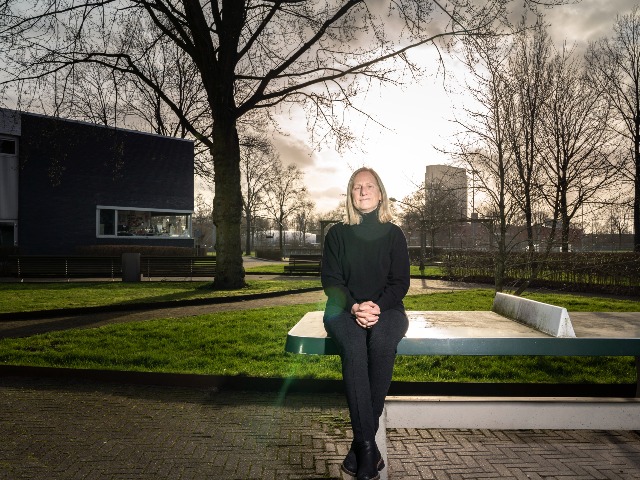Introducing new professor Mellie Pullman
| Date: | 22 April 2022 |

Mellie Pullman has recently been appointed as professor of Sustainable Supply Chain Management in the research programme Operations Management and Operations Research (OPERA). Pullman worked at universities in the United States and the United Kingdom before coming to Groningen. During a prior visit to the city for a conference, Pullman took a liking to Groningen and its university. After a sabbatical in 2020, she decided to make the move.
Why did you choose Groningen?
“I came to a EUROMA Sustainability conference at the University of Groningen in 2014 and really liked the colleagues, university and city. Last year after my sabbatical, I could not get back to the US so I asked the supply chain department if I could come as a visitor. The SCM group had a number of scholars working in sustainable supply chain, a more significant concentration than many schools in the US and the rest of Europe. This made FEB an ideal location to work with like-minded colleagues. As a visitor, I hoped to develop new projects for research in Europe such as focusing on sustainable seafood supply chains as well as the role of social enterprises in supply chains. Eventually FEB and the RUG found a way to create a permanent position for me through combining an appointment with the Teaching Academy as academic lead with a faculty position in the supply chain group.”
Could you tell us about your career so far?
“After studying at the University of Utah, I worked as a quality manager and test manager at several companies and as an entrepreneur in the beverage business and in landscape design. Later, I went back to school for my MBA and PhD, which I both obtained at the University of Utah, the latter at the Production & Operations Management department. Since 1997, I’ve worked in several different US and UK schools, such as Colorado State University, Cornell University, and the London Business School, in operations or supply chain management departments. For the last 15 years, I worked at Portland State University where I eventually became a full professor in supply chain management.”
Your chair is in Sustainable Supply Chain Management. What issues are dealt with in your research?
“I do research on several topics, but my focus is on food and beverages. Right now, I am working on research projects involving sustainable seafood supply chain issues, social enterprises, and innovation in the wine industry. First, the oceans face declining fish populations while illegal and unreported seafood catches make up more than 30% of all captured fish; we look for methods to solve these problems that relate to seafood supply chain management. Here we are exploring ocean technology such as blockchain for possible solutions. Additionally, modern day slavery and other labor problems are rampant on the boats and in the processing. To solve these problems requires a combination of market and regulatory solutions. Second, we are exploring social impact supply chain management (SISCM), supply chains that are part of social enterprises or those organizations that pursue a social mission enabled by an economic activity. SISCM addresses how a social enterprise manages its supply chain to fulfill its social mission and achieve economic viability. Here the social missions vary from providing renewable energy to remote African villages or training and placing disadvantaged workers in decent jobs. It is an emerging business model and very little research exists from a SCM perspective, but at FEB more colleagues focus on this area. Finally, I’m working with colleagues in France on how industry clusters can foster innovation in the wine sector. These innovations make the industry more sustainable by minimizing water and pesticide use as well as allow for better use of the grape crop as the climate changes.”
How about societal relevance?
“Food and biodiversity issues are on a collision course. From my perspective, it’s very important to society to mitigate the negative impact of human activities on biodiversity and at the same time, find solutions to feed the planet. Current fishing practices have a terrible impact on biodiversity due to things like net trawling, fish farming, and fishing gear debris left in the oceans. These practices kill many animals that are not destined for the plate. By looking at different ways to incentivize more appropriate practices and applying different ocean technology solutions to identify proper practices, we can help mitigate the negative impacts.”
What can we expect of you in the future?
“I have written a number of books and articles on sustainable supply chain management, food and beverage supply chain management and service operations and want to work more with my colleagues at the University of Groningen on other kinds of sustainability research. As part of my job as Chair, I am also the academic lead of the Teaching Academy Groningen. In this role, I will develop a vision for the university on how quality and innovation in teaching can be improved. I hope to inspire lecturers and students to contribute to the Teaching Academy and to increase the number of courses that integrate blended learning.”
For more information, please contact Mellie Pullman (m.e.pullman@rug.nl)
Key publications
Longoni, A., Luzzini, D. and Pullman, M. (2019). A Business for Society is Society’s Business: Insights from a Hybrid Supply Chain for Migrant Integration, Journal of Supply Chain Management, 55 (4), 3-33.
Pullman, M., Longoni, A. and Luzzini, D. (2018). The Roles of Institutional Complexity and Hybridity in Social Impact Supply Chain Management, Emerging Discourse Special Issue in Journal of Supply Chain Management, 54 (2), 3-20.
Dillard, J. and Pullman, M. (2017). Cattle, Land, People, and Accountability Systems: The Makings of a Values Based Organization, Social and Environmental Accountability Journal, 37 (1), 33-58.
Wu, Z., and Pullman, M. (2015). Cultural Embeddedness in Supply Networks, Journal of Operations Management, 37 (July), 45-58.

